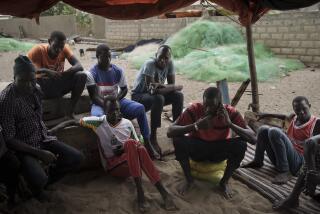Shipwrecked Skipper Describes Rescue at Sea
- Share via
COSTA MESA — Skipper David Giese of Costa Mesa looked at the bleary-eyed crew in the life raft and couldn’t bear to say aloud what he was thinking: They were going to die.
He and his five-member crew aboard the Morado, a 150-foot commercial fishing vessel, left Los Angeles Harbor in early March in calm seas for what was to be a 17-day trip to Ecuador.
Day 1 passed uneventfully, as did several succeeding days. But on Day 11, March 11, they were 64 miles off the Mexican coast when it all began to go wrong.
Arriving home after being rescued by a passing British cargo ship, Giese on Monday recounted how he and his men survived a harrowing adventure by limiting themselves to four ounces of water a day, a biscuit and many prayers.
They had spent two days in stormy seas when they hit 30-foot swells and 70-knot winds. The Morado first lost its steering and then its engine. The crew tried to save the vessel, but the ocean was too powerful for them and the ship.
“I remember that I put out a distress call about 6 p.m.” Giese, 41, said Monday after returning from Panama, where he had been hospitalized.
Ten minutes after Giese sent out the call, the crew abandoned ship, its stern at the water level and heavy waves pounding against its sides, ripping it apart.
“We all got in the life raft and I said, ‘Vaya con Dios [Go with God],’ ” Giese said, as the crew responded in kind, “Vaya con Dios. . . . It was the first of our prayers, and right then, I knew that they were all Christians.”
Giese and his five-man crew faced new dangers in the life raft.
“At one point, when we got pounded by a wave, everyone got tossed to one side of the life raft. The crew looked at me, and I looked at them, and I did not want to tell them what I was thinking . . . that we were going to die,” Giese said.
During the next four days, the men endured by rationing survival biscuits and tiny quantities of water, at times drinking their own urine. Two ships passed them even after they fired flares. That night, the men saw a light and fired more flares. This time, they were lucky. A British captain turned his cargo ship around and plucked them from the ocean.
“I felt just so elated,” Giese said. “I mean really, really elated. It was the most incredible feeling. I had no shoes and it was such a neat feeling to touch the side of the hard hull as I started to climb up the big ship’s ladder. It was great, like every step that I made you were going up and up and up and you can see this tiny little raft that you were leaving.”
Giese and his crew were taken to Panama City, where they were treated for exposure. Several were hospitalized, including a crew member who was severely cut in the stomach while getting into the raft. Giese was bruised and injured two vertebrae when he got slammed against a chart table when the Morado was hit by a big wave.
Rescued with Giese were crew members Alberto Mendez Cadenas, the chief engineer from San Pedro, assistant engineer Enrique Carballo Lucero of Ensenada, helmsman Guadalupe Joel Velazco of Ensenada, chief cook Jorge Antonio Mero Macias of Ecuador and chief officer Jose Ganuza Andueza of Spain.
The only fatalities were two dogs that got swept off the Morado, an 8-week-old basset hound and Brandy, a 2-year-old bulldog.
*
When Giese and the crew got on board the cargo ship that rescued them, they were “in pretty bad shape,” said the British captain, who spoke on condition of anonymity.
“They were pretty frightened and glad to be on board,” the captain said in a telephone interview. “They had seawater rashes and they had trouble straightening their legs because they had been so cramped inside that raft. They were lucky. Although they had quite a bit of water and rations left, they could have quite easily have run out of those in the next few days.”
Capt. Alston Newball, general manager of Agencia Naviera Servimundo, a steamship agency in Panama City, said his firm was asked by the Morado’s owners to help the rescued seamen get medical attention, hotel accommodations and airline tickets to return to their native countries.
The six men suffered serious sunburns and “sores from being in the water too long,” Newball said. Of the crew, the Spanish sailor appeared the most traumatized, Newball said.
“The American [Giese] was in good spirits,” Newball said. “He was not depressed. He found a girlfriend very quickly.”
“They are very lucky to be alive,” Newball said. “To survive the bad weather required a lot of courage. . . . The captain did the right thing by rationing the food and water.”
*
Times staff writer Davan Maharaj contributed to this story.


